Basil, also known by its other name — sweet basil, is widely grown as a kitchen herb for its aromatic leaves. It belongs to the mint family and adds a delightful flavor to meats, fish, salads, and sauces.
And, like many other herbs, basil has many culinary and medicinal benefits for us humans. But what about our feline pals? Do the benefits extend to them?
As we know, cats are extremely curious animals, and they like to experiment a lot with their surroundings. And you don’t want her to get into trouble chewing something strange.
So, can cats eat basil? Is basil safe for cats?
Well, let’s find out.
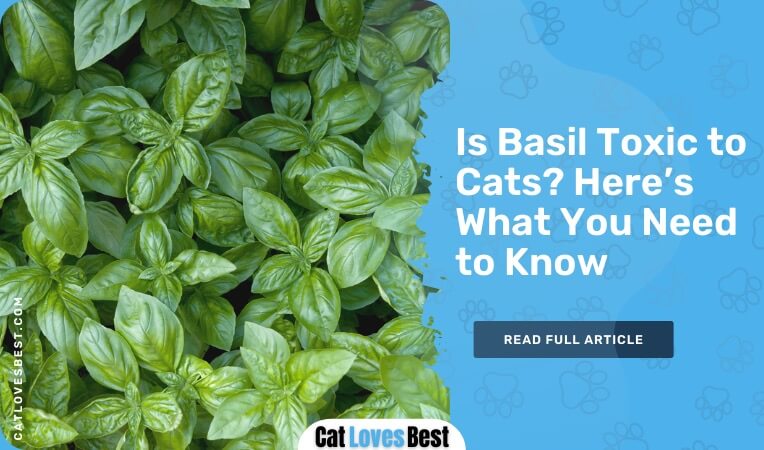
Is Basil Safe for Cats or Is It Toxic?
Yes, basil leaves are safe for cats. Whether they are in dried form, cooked form, or even fresh — basil leaves should not be harmful to your kitty cat. Therefore, there is no need to worry if your cat steals a few basil leaves from the basil pot or from your food plate.
However, on the other hand, it has been reported that some cats experience diarrhea or vomiting, but these side effects are very rare.
Fortunately, basil is not one of the toxic herbs like Indian borage, which can cause poisoning in cats. In fact, cats can safely lick and sniff it, as well as rub against the basil leaves. Moreover, some cats may also like to chew on the basil leaves, just out of curiosity.
Why Do Cats Eat Basil?
Basil leaves are safe for cats, but why do cats eat them? Cats don’t have the same taste of basil leaves like the way we humans do.
The smell, flavor, or texture of the basil leaves may be naturally unpleasant to some cats, but others will do it for the same purpose as eating grass strands.

As we know, cats are obligate carnivores, meaning that they won’t really benefit from plant-based diets. However, cats are curious animals, and they always feel the need to examine everything around them. So, if you have basil growing in your garden or have a basil pot in the house, it is likely that your cat would go near it and might eat the leaves.
Are Cats Attracted to Basil?
It’s true that cats love to smell catnip, but can a herb like basil give cats a sensory blast in the garden? Well, we are not really sure. But fresh and green vegetation seems to be a cat’s favorite thing to nibble on.
That sounds strange since cats are obligate carnivorous in the wild. But it’s not unheard of for cats to nibble on plants, whether they do it out of boredom or just for the added nutrients or fiber, or maybe because of the taste.
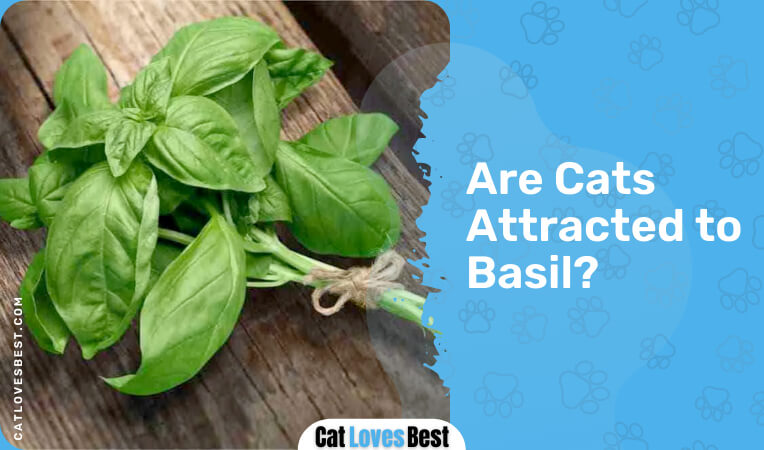
As for the herb basil, some cats seem to like the minty smell, while others may like the thick texture of the leaves. However, the attraction may not be that hard, as once they are satisfied with the smell or the texture of the basil leaves, they will evaluate the plant and find it either gross or satisfying.
Otherwise, your cat might be attracted to basil plant just because she is bored, and there is nothing wrong with that.
What Will Happen if Your Cat Eats Basil?
If your cat eats one or two basil leaves, then it is nothing to worry about, as basil leaves are not toxic to felines. But if you notice your cat constantly eating basil leaves, there might be something wrong with her stomach. If this is the case, then you should seek your vet’s help on what to do next.

On the other hand, if your cat ate some cooked basil leaves from your food plate, then there is nothing to worry about since the cooked basil leaves won’t do any harm to your kitty’s health. However, the other ingredients in the meal could be harmful to your cat and may cause your cat to show symptoms such as vomiting or diarrhea, or other side effects.
Although it is rare, some felines might experience stomach issues such as diarrhea or even vomiting from ingesting basil leaves. And though cat allergies from edible plants are quite uncommon, it’s possible that some cats can get a rash after being in contact with the fresh basil leaves.
Like I said before, the side effects of eating basil leaves in cats are quite rare — however, if you think your pet is showing any side effects, you should immediately call your vet for help.
However, in the end, if your cat has eaten a few basil leaves, but is now showing any symptoms, then there is no need to worry. At the same time, if your cat is showing mild side effects, you should seek your vet’s advice or call a nearby animal emergency clinic.
Are There Any Health Benefits of Basil for Your Cat?
For us, humans, the basil leaves have a plethora of health benefits to offer. The benefits can vary from fighting off stress and depression to boosting physical health with its anti-oxidant and anti-inflammatory attributes.
Though the basil leaves are not entirely beneficial for cats, there are some particular properties that they have which can be beneficial in some places.
Let’s discuss this in a little detail.
Basil Can Help Kitties to Relax
Though cats are obligate carnivores and cannot digest most plant nutrients, the antioxidants in the basil leaves might be beneficial to your cat’s health. Moreover, this can be particularly helpful if your kitty has arthritis or other ailments which result from the effects of old age.
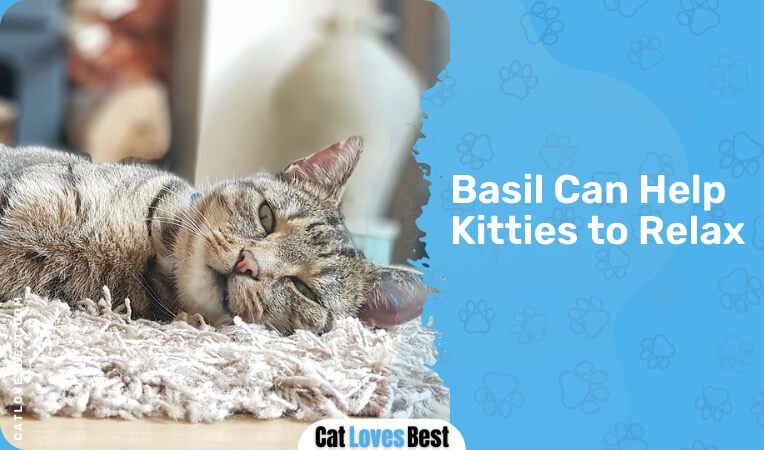
For instance, if your cat has anxiety or recently has been through a situation that caused anxiety in your cat, then a bit of basil might help her to relax.
High in Calcium & Vitamin A
While some cats hate the smell or taste of the basil leaves, others might actually like it. And if your cat does like it, then maybe you should sprinkle a little on top of her food as a treat.

Moreover, the basil leaves are also high in calcium. So, if your cat likes to eat basil, then you should offer it to your cat as a small calcium treat. At last, basil leaves are not only high in calcium but also in vitamin A. Your kitty cat might already have a great low light vision, but stronger teeth and bones are a plus to a curious animal such as a cat, whose curiosity can lead them into dangerous situations.
Get Rid of Fleas
And when it comes to using basil oil for fleas, it offers up some amazing benefits. Basil oil works great as a natural insect repellent. Likewise, you can make use of the oil of basil as a natural insect repellent to remove fleas, ticks, and mosquitos from the coat of your cat.
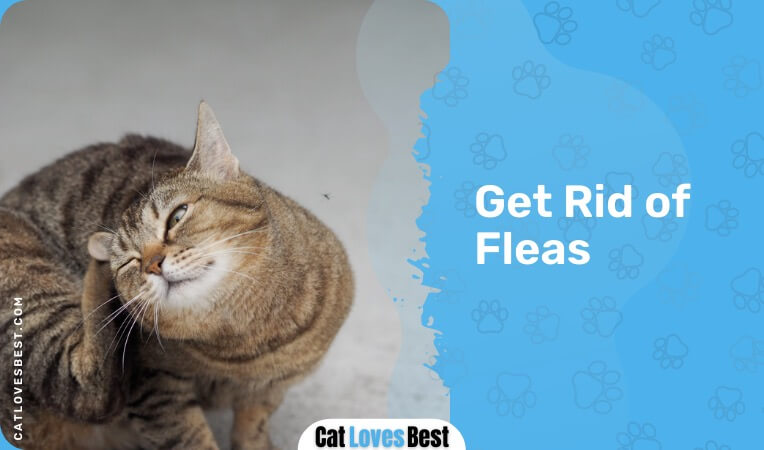
However, you should consult with your vet before doing so.
Can Basil Be Bad for Cats?
Basil is good for a few reasons, such as it is a good anti-inflammatory and anti-anxiety agent. It can help in lowering blood pressure. But blood pressure that is too low can be as bad as blood pressure that is high.
On the other hand, basil is not entirely beneficial for cats, since these animals are carnivorous, and they cannot really absorb the nutrients of this herb. While there aren’t really any benefits for cats to gain from basil, there are some downsides to this herb.
Now, let’s look at the reasons how basil can be bad for cats.
Allergic to Some Cats
Basil leaves, if eaten by a cat, can cause her blood to clot at a slower rate, which can be bad, especially if the cat gets wounded.
Moreover, some cats may also have an allergic reaction to basil. You should keep your cat away from basil leaves if she is showing allergic reaction signs such as hives, swelling, discharge, vomiting, or respiratory problems after coming in contact with basil leaves.
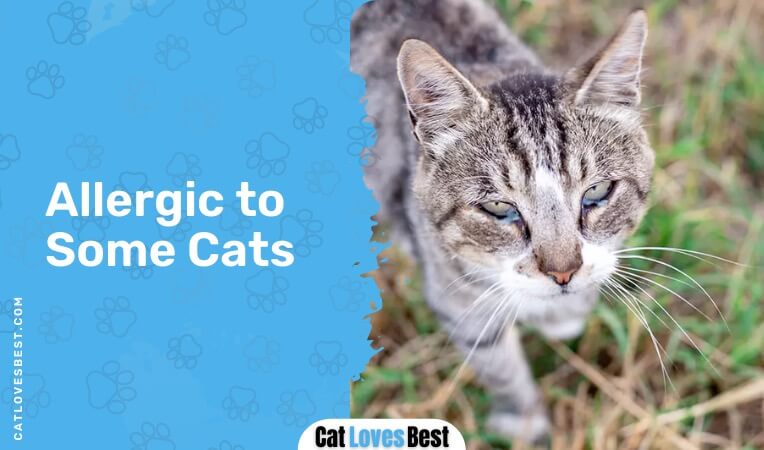
This means that your cat is allergic to basil, and you should not let her go near it. However, if the scent of basil keeps attracting your cat again and again, you should surround the basil pot with plants such as rue, lavender, rosemary, and pennyroyal. These plants work great as cat-repellent. Moreover, cats are also repulsed by anything that has a citrus smell.
Digestive Problems
Cats are not comfortable with the digestion of grass and plants, since they are carnivores. Eating basil might cause vomiting and other gastrointestinal problems, however, the chances are very low.
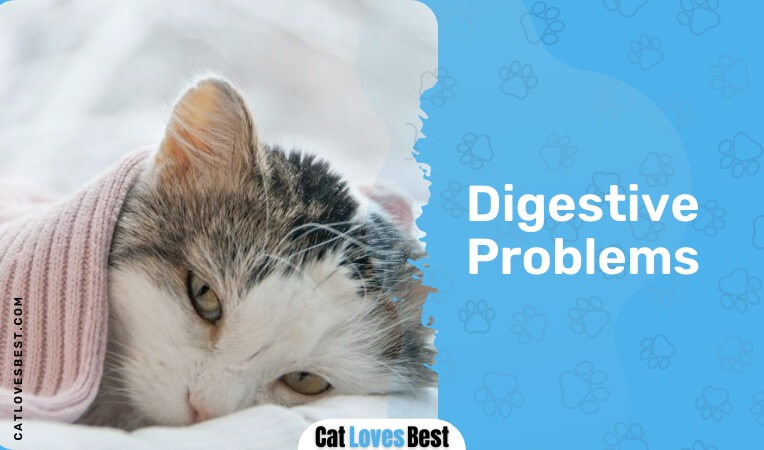
Other than that, if the leaves of basil are infested with insects and pests, then you should try to keep your cat away from it.
Final Thoughts
So, is basil toxic to cats? The quick answer is no, basil is not toxic to cats. Basil is safe to have around cats, whether it is in the form of fresh leaves, cooked, or dried, consuming basil should not harm your pet at all.
Likewise, it is okay if your cat is nibbling on the basil leaves due to boredom, however, daily consumption is not recommended.
So, now you don’t have to worry about growing this dainty herb in your garden.
References
- Non-toxic plants for pets — ASPCA
- Planting Herbs Safe for Cats — Found Animals
- Antibacterial and antifungal activity from basil in cats — National Library of Medicine

